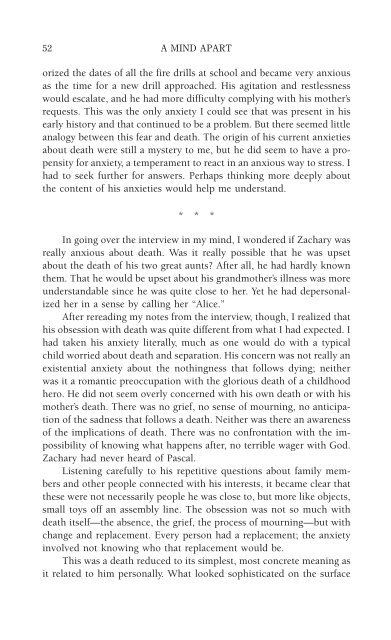978-1572305441
autism
autism
Create successful ePaper yourself
Turn your PDF publications into a flip-book with our unique Google optimized e-Paper software.
52 A MIND APART<br />
orized the dates of all the fire drills at school and became very anxious<br />
as the time for a new drill approached. His agitation and restlessness<br />
would escalate, and he had more difficulty complying with his mother’s<br />
requests. This was the only anxiety I could see that was present in his<br />
early history and that continued to be a problem. But there seemed little<br />
analogy between this fear and death. The origin of his current anxieties<br />
about death were still a mystery to me, but he did seem to have a propensity<br />
for anxiety, a temperament to react in an anxious way to stress. I<br />
had to seek further for answers. Perhaps thinking more deeply about<br />
the content of his anxieties would help me understand.<br />
* * *<br />
In going over the interview in my mind, I wondered if Zachary was<br />
really anxious about death. Was it really possible that he was upset<br />
about the death of his two great aunts? After all, he had hardly known<br />
them. That he would be upset about his grandmother’s illness was more<br />
understandable since he was quite close to her. Yet he had depersonalized<br />
her in a sense by calling her “Alice.”<br />
After rereading my notes from the interview, though, I realized that<br />
his obsession with death was quite different from what I had expected. I<br />
had taken his anxiety literally, much as one would do with a typical<br />
child worried about death and separation. His concern was not really an<br />
existential anxiety about the nothingness that follows dying; neither<br />
was it a romantic preoccupation with the glorious death of a childhood<br />
hero. He did not seem overly concerned with his own death or with his<br />
mother’s death. There was no grief, no sense of mourning, no anticipation<br />
of the sadness that follows a death. Neither was there an awareness<br />
of the implications of death. There was no confrontation with the impossibility<br />
of knowing what happens after, no terrible wager with God.<br />
Zachary had never heard of Pascal.<br />
Listening carefully to his repetitive questions about family members<br />
and other people connected with his interests, it became clear that<br />
these were not necessarily people he was close to, but more like objects,<br />
small toys off an assembly line. The obsession was not so much with<br />
death itself—the absence, the grief, the process of mourning—but with<br />
change and replacement. Every person had a replacement; the anxiety<br />
involved not knowing who that replacement would be.<br />
This was a death reduced to its simplest, most concrete meaning as<br />
it related to him personally. What looked sophisticated on the surface



